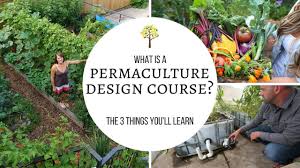The Benefits of Taking a Permaculture Class
Permaculture, a design system that integrates sustainable agriculture, ecological principles, and community building, has been gaining popularity as people seek ways to live more harmoniously with the environment. One way to learn about permaculture and its practical applications is by taking a permaculture class.
Permaculture classes offer participants the opportunity to delve into topics such as organic gardening, water conservation, renewable energy systems, and regenerative land management. Through hands-on activities, lectures, and group discussions, students gain valuable knowledge and skills that can be applied to their own homes, communities, or professional endeavors.
One of the key benefits of taking a permaculture class is the chance to connect with like-minded individuals who share a passion for sustainability and environmental stewardship. By engaging with fellow students and instructors, participants can build a supportive network of individuals committed to creating positive change in their local environments.
Furthermore, permaculture classes often provide practical tools and resources that empower students to implement sustainable practices in their daily lives. Whether it’s learning how to design a food forest, build a rainwater harvesting system, or create a composting system, participants come away from the class with tangible skills that can make a real difference in their communities.
By taking a permaculture class, individuals not only expand their knowledge of sustainable living practices but also contribute to the larger movement towards creating resilient and regenerative systems. Whether you are an experienced gardener looking to deepen your understanding of ecological design or someone completely new to permaculture seeking inspiration for positive change, enrolling in a permaculture class can be a transformative experience.
Consider signing up for a permaculture class today and embark on a journey towards creating more sustainable and thriving communities for future generations.
Top 5 Frequently Asked Questions About Permaculture Classes
- What is permaculture and how does it relate to a permaculture class?
- What topics are covered in a typical permaculture class?
- Who can benefit from taking a permaculture class?
- Are there any prerequisites for enrolling in a permaculture class?
- How can I apply the knowledge and skills learned in a permaculture class to my daily life?
What is permaculture and how does it relate to a permaculture class?
Permaculture is a holistic design system that aims to create sustainable and regenerative human habitats by mimicking natural ecosystems. In essence, permaculture seeks to harmonize the relationship between people, the environment, and resources through thoughtful design and ethical principles. When it comes to a permaculture class, it serves as a gateway for individuals to delve into the core concepts of permaculture, such as sustainable agriculture, water management, renewable energy, and community building. By taking a permaculture class, participants not only learn about the principles and practices of permaculture but also gain hands-on experience in applying these principles to real-life scenarios. Ultimately, a permaculture class provides individuals with the knowledge and tools needed to create resilient and thriving systems that benefit both people and the planet.
What topics are covered in a typical permaculture class?
In a typical permaculture class, participants can expect to explore a wide range of topics related to sustainable living and ecological design. These may include organic gardening techniques, soil health and fertility, water conservation and management, renewable energy systems, permaculture ethics and principles, food forests and agroforestry, natural building methods, waste reduction and recycling practices, community resilience strategies, and regenerative land management approaches. Through a combination of hands-on activities, lectures, discussions, and practical demonstrations, students gain a comprehensive understanding of how permaculture principles can be applied to create more sustainable and resilient systems in both urban and rural settings.
Who can benefit from taking a permaculture class?
Individuals from all walks of life can benefit from taking a permaculture class. Whether you are a seasoned gardener looking to deepen your knowledge of sustainable practices, a homeowner seeking to create a more eco-friendly landscape, a student interested in environmental conservation, or a professional in the agriculture or design fields wanting to incorporate permaculture principles into your work, a permaculture class offers valuable insights and practical skills. Anyone with a curiosity for living in harmony with nature and a desire to contribute to a more sustainable future can find inspiration and empowerment through learning about permaculture.
Are there any prerequisites for enrolling in a permaculture class?
When considering enrolling in a permaculture class, one common question that arises is whether there are any prerequisites for participation. The beauty of permaculture education is that it welcomes individuals from all backgrounds and experience levels. Whether you are a seasoned gardener, a sustainability enthusiast, or completely new to the concept of permaculture, there are typically no formal prerequisites for joining a permaculture class. Instructors often design their courses to accommodate participants with varying levels of knowledge and experience, creating an inclusive learning environment where everyone can benefit and contribute. So, if you have a curiosity for sustainable living practices and a desire to learn more about ecological design, consider enrolling in a permaculture class to expand your horizons and connect with like-minded individuals on a journey towards creating positive change.
How can I apply the knowledge and skills learned in a permaculture class to my daily life?
Learning about permaculture in a class equips you with valuable knowledge and practical skills that can be applied to your daily life in numerous ways. By understanding concepts such as sustainable gardening, water conservation, and regenerative design, you can implement eco-friendly practices in your home or community. For example, you could create a backyard food garden using permaculture principles, set up a rainwater harvesting system to reduce water waste, or design a composting setup to recycle organic waste. These small yet impactful changes not only benefit the environment but also enhance your quality of life by promoting self-sufficiency, resilience, and connection to nature. Embracing permaculture principles in your daily routines can lead to a more sustainable and harmonious lifestyle for yourself and the planet.

